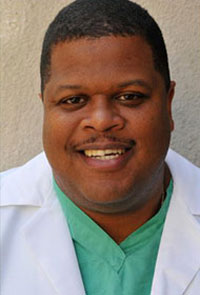Intro blurb here
Supporting Graduate Medical Education
[ADD LANGUAGE HERE ABOUT THE IMPORTANCE OF SUPPORTING GRADUATE EDUCATION.]
To advance our efforts in supporting and improving graduate medical education and the School of Medicine more broadly, we are pleased to announce several important changes and promotions with the school leadership.

Paul Gladden, MD, Associate Professor of Orthopedics and Program Director of the Orthopedics residency program, is being promoted to Associate Dean for Graduate Medical Education and DIO (Designated Institutional Official for ACGME). Dr. Gladden joined Tulane in 2009, and has served as the Assistant Dean for GME and Assistant DIO, Director of the Orthopedic Residency, Chief of Orthopedics Trauma Service and Surgery at UMCNO, and a Surgeon for the United States Marshals and The New Orleans Police Department. He is also the Associate Chief Academic Officer for UMC. We look forward to Paul’s service in these new roles and responsibilities. An interim program director for Orthopedics will be named soon.
Dr. Gladden will succeed Jeffrey Wiese, MD, who will be stepping down as DIO after having served for over 15 years. We want to thank Dr. Wiese and congratulate him for his many accomplishments.

Cindy A. Morris, PhD, Professor of Microbiology, is being promoted to Associate Dean for Admissions. Dr. Morris started her academic career at Tulane in 1993 and has been an active researcher in the mechanisms of HIV-1 gene regulation and angiogenesis, a dedicated MD admissions committee member and interviewer, and has served as the Assistant Dean for Admissions since 2015.

Bennetta C. Horne, MS, is being named as Assistant Dean for Equity, Diversity and Inclusion while continuing her role as Director of the Office of Multicultural Affairs. Ms. Horne began her Tulane career in 2003 as an Operations and then Program Manager in the Center for Bioenvironmental Research. In 2012 she served as an Accountant and then Program Manager in Chemical & Biomolecular Engineering, and in 2015 was chosen to establish and lead the School of Medicine’s Office of Multicultural Affairs. In this role Ms. Horne has made tremendous strides in increasing the cultural sensitivity of the student body, faculty, and staff to all areas of diversity, as well as in improving overall diversity through our recruitment and retention efforts.

Rhonda Coignet, MBA, is being appointed as the Senior Director for Graduate Medical Education. Ms. Coignet joined Tulane in 1996, and has provided leadership in many key areas, including as Executive Director of Strategic Planning, Executive Director for Development Administration/Special Assistant to the Executive Vice President, and Interim Assistant Provost for Assessment & Institutional Research. Most recently she has served as the Director of Accreditation and Special Programs for the School of Medicine, where she prepared for accreditation site visits and supported the GME program. In this new role she will amplify her efforts, supporting the DIO, Program Directors, Program Coordinators, Residents, Fellows, and others in exceeding ACGME’s expectations for quality in graduate medical education.
More robust descriptions of these individuals, their accomplishments, and positions are linked here.
To continuously improve and evaluate the operation, oversight and supervision of graduate medical education at the School of Medicine, Norton Rose Fulbright has been retained to make recommendations to leadership. Feedback from Norton Rose Fulbright is expected to be received ___TBD____.
Fostering an Equitable, Diverse and Inclusive Environment
[ADD LANGUAGE HERE ABOUT THE SOM’S COMMITMENT TO EDI.]
In early 2021, Tulane engaged Sensei Change Associates to deepen the understanding of the experiences of faculty, staff, students, and residents at the School of Medicine. Sensei Change worked with the Office of Academic Affairs and Provost to conduct an organization culture assessment to gather input for future development of the School of Medicine’s effectiveness in serving its mission of research, education, and clinical care.
The two primary data gathering methods were focus groups and 1:1 interviews with faculty, staff, students, fellows, residents, alumni, staff, and administrators. Participants contributed their input and insight about the organizational culture, gender, and race relationship dynamics. They represent diverse social identity groups – women, LGBTQ+, African American, LatinX, Asian Pacific Islanders, and BIPOC.
The broad range of participants provided an important array of perspectives about the School of Medicine’s organizational culture regarding equity, diversity, and inclusion (EDI) to achieve critical insights and develop significant recommendations for future strategic EDI organizational changes.
Major Themes
As a result of the assessment, several major themes arose that included the following:
- There is a love for Tulane School of Medicine and a desire to ensure development for the long term. How can this positive support be leveraged to help the necessary culture transformation?
- Gender disparities lead to an established pattern of a self-perpetuating and reinforcing cycle. What can help to address challenges from traditional hierarchical power dynamics that create inner versus out circles of influence?
- Significant racial dynamics occur. What possibilities can improve communication to increase transparency and trust, including an effective reporting system?
Recommendations
Discussions of the findings resulted in nine recommendations for organizational culture change to effectively integrate equity, diversity, and inclusion into the School of Medicine’s patient care, medical education, medical research, and organizational performance. The list of recommendations will need 3-5 years for implementation with some overlapping initiatives:
Recommendation #1: Leadership development with intercultural competencies and organization change management skills for large scale organization development intervention.
Recommendation #2: Conduct a reconciliation process regarding the divergent perspectives of leadership versus outsiders who have polar opposite views.
Recommendation #3: Develop a robust strategic organizational communication system that proactively manages culturally appropriate and sensitive messaging through multiple channels to effectively reach the intended receivers.
Recommendation #4: Create a comprehensive EDI strategic plan for School of Medicine that is communicated and understood by all constituents.
Recommendation #5: Conduct a thorough audit and development of a comprehensive medical education strategy that integrates EDI at every level of learning from medical students to residents to fellows and to leadership.
Recommendation #6: Alignment of the Office of Multicultural Affairs with the EDI strategic plan.
Recommendation #7: Invest in the development of the Office of Multicultural Affairs that enables the leading and facilitating of organization culture change.
Recommendation #8: Create a safe reporting process that is effective and useful for people who need to report incidents related to EDI.
Recommendation #9: Renovate and/or refresh the Hutchinson Building and Tulane Medical Center.
A more detailed report from Sensei Change and Associates can be found here. (Add hyperlink once we have the public report from Sensei Change.)
The School of Medicine is working with the Tulane community at large to advance the Strategy for Tomorrow, which is a long-range strategic plan to advance equity, diversity and inclusion. This process is being led by Anneliese Singh, associate provost for faculty development and chief diversity officer. Currently, Benetta Horne, assistant dean for equity, diversity and inclusion at the School of Medicine, is serving on Strategy for Tomorrow Steering Committee. Beginning in September 2021, Ms. Horne will lead the SOM’s unit-based five-year strategic plan in her new capacity as assistant dean.
More details about the Strategy for Tomorrow can be found here.
Reporting
[ADD A GENERAL STATEMENT HERE ABOUT THE IMPORTANCE OF REPORTING STRUCTURES THAT OUR COMMUNITY MEMBERS TRUST.]
The School of Medicine recognizes that some reporting systems should be further developed and expanded to build trust within the community. A Professionalism Task Force that will include a diverse cross-section of faculty, staff, residents, and students has been created. This Task Force will evaluate the effectiveness of our systems to report and address unprofessional behavior of any kind.
Tulane University takes all incidents of bias, harassment, and discrimination very seriously. Please use this tool (hyperlink to SOM reporting tool) to report all such incidents. The proper University department responsible for investigating the matter will be in touch. While we welcome all submissions, please note we are unable to provide follow-up information to anonymous feedback.
Community Engagement and Feedback
[ADD LANGUAGE HERE ABOUT US ALL DOING THIS WORK TOGETHER AND WE CAN’T DO IT WITHOUT HEARING FROM YOU...]
From time to time, the School of Medicine leadership will host townhalls or similar events to engage directly with the SOM community. Information regarding the town halls can be found here.
[HOLD SPOT FOR TOWN HALL AND DEAN OFFICE HOURS INFORMATION HERE.]
The School of Medicine looks forward to your ideas and suggestions and encourages you to provide feedback via this form. Your feedback is important; only together can we move forward.
[HOLD A SPOT FOR HYPERLINK/BUTTON TO FORM TO RECEIVE FEEDBACK HERE.]
Recent Communications
[ADD SHORT BLURB AND THEN LINK TO OR LIST recent SOM communications here.]
